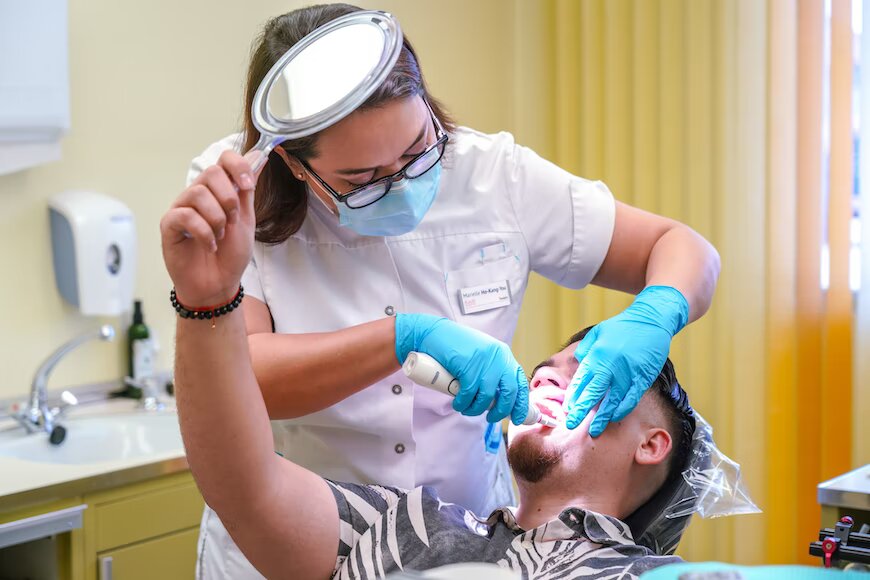By: Nancy Amon
Ever heard of the term “bruxism”? It is the name given for the medical condition where someone grinds their teeth or clenches their jaw, often unaware. Numerous folks don’t know they’re doing this but will experience frequent headaches and neck pain as those muscles tense.
Lots of people around the world have experienced this, especially during times of high stress and during their sleep. A study in Canada suggested that nearly 46% of people partaking in a study complained of sleep deprivation due to sleep bruxism.
Why Do People Experience Bruxism or Jaw Clenching?
- It may run in the family occurring as a genetic behaviour.
- It could be stress or anxiety.
- Sleep disorders like sleep apnea might cause it.
- Teeth misalignment and abnormal jaw shape could result in it.
- Excessive alcohol intake.
- Certain illicit drugs and prescription drugs.
Can you Tell If you Grind your Teeth?

Image credit | Unsplash
Bruxism or teeth grinding occurs due to many possibilities and can even stem from hereditary factors. People going through peak stress levels at work or even at home can experience more headaches and jaw pain, which may result from frequently clenching their teeth. This is almost like a reaction or a reflex the body does during times of stress.
Teeth grinding can also happen because of anxiety or abnormalities in the alignment of teeth, such as an overbite or an underbite. Other folks may experience that their sleep apnea is causing their teeth to grind. Either way, if you are experiencing pain due to jaw clenching, visit your dentist and get the correct treatment.
It’s not always easy to tell if you are grinding your teeth. Most people experience sleep bruxism, except for people grinding their teeth during the day or at the time of peak stress.
Symptoms of teeth grinding may include but are not limited to the following:
- May experience a dull headache or a more painful one.
- Jaw pain may occur.
- Neck pain and shoulder pain could be linked to tooth grinding.
- Sore facial muscles.
- Bleeding gums may occur.
- Damaged or worn teeth.
- Problems sleeping.
Why is Bruxism Bad?
Bruxism can damage perfectly healthy teeth leading to eventual tooth loss. Tooth loss can result because the gums, with time, begin to recede and causes the roots to expose for some people and, thus, loss of teeth. Grinding your teeth can also cause loss of fillings and lead to damaged crowns. Visiting a dentist can help rule out tooth problems and create solutions to manage them.

Image Credit | Unsplash
How Can I Manage Bruxism at Home?
Have a custom-made biteplate or gum guard for sleeping
Your dentist can help you by making a custom-fit bite plate or night guard that you could wear while you sleep. This will prevent damage to your teeth and ease the pain associated with teeth grinding.
You could also buy a night guard from a health store, but these often require boiling a standard mould to fit the mouth more comfortably. It doesn’t always work as effectively as when the dentist makes one suited to your mouth.
Try relaxing techniques
Finding ways to relax can help you significantly reduce jaw clenching, headaches, and other associated symptoms. You can try breathing exercises, guided meditation, and exercises like yoga to get into a calm state. Gentle stretches can also assist in creating a relaxed state of body and mind.

Image credit | Unsplash
Exercises
Doing exercise like walking, cycling, and weightlifting can help your body produce hormones associated with relaxation and reduce stress hormones. Some people can also benefit from gentle, low-impact exercises on the joints, like swimming and gentle yoga routines.
Create a Good Sleep Routine
Preparing for bed is important and is more than simply hopping into bed after a flick. Some people find drinking a soothing tea like chamomile is good for relaxing and inducing sedation. Doing a meditative routine before bed can also improve your body’s state of relaxation before sleeping.
Avoid eating heavy meals right before going to sleep, as this will make it hard for your body to digest, and it can result in disturbed sleep.
Another thing to avoid is drinking too late as this can cause frequent toilet trips, again disturbing sleep.
Conclusion
If you are feeling pain in your jaw, having headaches, and the other symptoms mentioned in this article, it might be time to visit your dentist and discuss these with them. Treating and managing bruxism can help improve your life.
